|
St. Elizabeth of Hungary Catholic Church has received a Hope in Action award by Kentucky Interfaith Power and Light. For details, see here: www.kentuckyipl.org


Nashville breadroot, Pediomelum subacaule. Cedars of Lebanon, TN.
(*photo credit)
November 1, 2018 Call Forth the Overlooked Saints
Today we honor ALL the saints -- not just those canonized in some formal manner. When some artists depict this day, we suddenly see a montage of saints we recognize -- Mary, Paul, Francis, etc. However, this is misleading. The picture should have been of your grandmother and the vendor down the street who was kind to everyone in need. Today, we honor the merciful, generous, hard-working, loving and peaceable folks, who raised families and scraped for their upkeep, who suffered without complaint, who bravely looked death in the face, and who went on to the Lord by the millions and billions throughout the ages. Close relatives decorated their graves for a time, and when they too became feeble and passed on, plots became overgrown, forgotten and reused. Life went on, and the departed became a statistic. Is that the whole story?
The span of living human memory is not the end. God remembers, and calls the countless home to heaven; the good Lord blesses them with renewed life and gives them the gift of eternity -- something way beyond Earth-bound memory. Their graves have overgrown, but their worthy deeds shine among the company of the elect. We are challenged to follow in the footsteps of popular saints who died in heroic fashion. We are also challenged to realize that ordinary folks who were faithful are also worth using as examples and even praying to, since they are now in special divine favor. Thus, we see that sainthood is not just for the very special and unique few, but that special gifts are present in everyone. With God's grace all have the opportunity to gain eternal salvation and to join together within a glorious throng -- not as single individuals apart from others, but as members of a growing chorus of those who enter the Light.
------------------
Prayer to All Unknown Saints
Saints of the universe, we trust you are numerous and somewhat nameless, except within your own eternal company. You have all unique qualities for persevering and continuing with enthusiasm in the praise of the Almighty. We call upon all of you to assist us in the work ahead. We look to you, because we do not wish to push another from "limited" heavenly space, to excel over others, to stand out apart from others. Rather we come to know that individually we can be lost, but in sharing with companions we are saved. We rest in confidence that the Lord will give us needed grace to join your ranks -- the poor, the weak, the ill, and those who are so often overlooked. To save our Earthly community requires large numbers of workers imitating you in fidelity and enthusiasm. You laid the groundwork for glory in small and patient ways. You gave gradually of yourselves until your physical energy ebbed away, and life was transformed into eternal light. You excelled through a collective excellence; you participated with unselfish devotion. Guide us in doing the same, for we seek to follow your example and join you in due time.
Solidify Internet Controls
During November we continue our reflections on taking Internet from tech giants and returning it to the people. Profiteering must cease and the Internet be free, open and safe, even if it takes a citizen-monitored government to make this occur. The Internet is a public utility, a natural monopoly, for it is the modern means of global communication that is meant to break isolation and encourage people to converse and collaborate in saving our threatened planet. While the Internet is a powerful instrument, especially in times of emergency, still it must be respected and properly controlled. Being in the public domain this demands individual constraints and public policing, something that profit-makers are incapable of through their own motivation and temperament.
Users need self-control. User beware! Many individual Internet users are prone to being victimized through neglect of safeguards or a trust of some who offer to help but are scammers. Procedures exist for users to act responsibly and enhance their own safety. Personal controls include turning off devices when not in use, never open suspicious emails, detect a scam at the earliest opportunity and manage passwords carefully. For those more prone to being victimized such as the elderly, it is wise that fellow advisors be consulted when something suspicious occurs on the Internet, a public network. All users must stand behind what they write and never speak ill of others through anger and loss of self-control. There are limits to use in order to avoid overuse, especially by the isolated and insecure. So much is personal in social media that we wonder how it could be monitored in a realistic fashion while honoring privacy.
Recognize new trends. Online essential and luxury purchasing and personal finance management are labor-saving devices that are rapidly becoming popular. Of the respondents who now make online purchases at least once a month, over half spend as much or more on purchases there than as in-store. A clear majority with modern apps will never again shop in-store for clothes once hooked on the digital commercial practice. Now some 65% of online shoppers admit to using their mobile devices for purchases due to ease in use and saving time. More important in coupling interrelated problems, 63% of customers made an online purchase after seeing a digital advertisement and, to be fair in this discussion, the majority (60%) saw the ad on social media -- a reason for Amazon's amazing growth. Big is getting bigger, but what is too big?
Maintain constant awareness. Information control can be a source of power that could be misused. Currently Google tracks users even after the users ask them to stop doing this. We ask why should private companies have a "right" to know where you are at every moment? Should the government or private commercial groups be able to seek and dispense with information gathered through these modern techniques? To infringe on personal privacy goes beyond the realm of decency and threatens citizen democracy. Could tech giants become a big brother watching our every step?
Accept citizen duties. When broader complex issues arise we are tempted to search for a wise expert to speak for us. We forget that a democracy requires us to work as citizens through community discernment, even when this adds to the onus of citizen monitoring. Multitasking can be harmful when driving in congested areas or when skipping through snake country. However, a number of tasks can be handled in consecutive order in our everyday life. Medium-range problems (Internet control) and long-range problems (climate change) have a special place in overall citizen attention. This becomes a challenge, for our culture of convenience is not one that easily moves to time-consuming civic duties.
Battling cultural tendencies. We must confront the continual drive for convenience and comfort. While people like the convenience of online shopping and ease of social conversation, one must recall that civic duty includes familiarity with issues and taking steps such as conversation, meetings and voting. We like what Internet can give in benefits, but are slower at becoming politically involved in its improvement. We must act as responsible citizens, especially in troubled times.
Badger regulators and legislators. At the time of the Second World War when little Finland was locked in battle for national life with the larger invading Soviet armed forces, the national radio continually played the major melody of Sibelius' Finlandia to arouse the people to fight with bravery -- and it worked; a mass media was used to rally people to an extraordinary cause. Today we have an environmental crisis. Internet is the people's unitive instrument today and potentially can be mustered to the cause of saving our imperiled planet from the ravages of an impending climate change (3 or 4 degrees Celsius warmer global temperatures above pre-industrial averages). We must focus and act together, and social media is the platform for such action -- if we can be moved to act and accept the responsibility to belong to the community of nations. Let's constantly remind fellow Americans.
Work for a spiritual balance. Some matters touch us deeply: physical or mental health, interpersonal relations, or everyday finances. Lack of quick solutions can be stressful. Those advising us may say "lighten up," "take a walk," "do some gardening." Christian believers hold that there are good and bad spirits, and part of our authentic conversation with the Lord is to discern which spirits are affecting our lives at given times. With the possibility of either good or bad spirits, we realize that the term "spirituality" is not neutral. The authenticity of Biblical prophets emerged in honesty in treating current issues. A good prophet tells things as they are -- realism in all its rawness and not just what the audience wants to hear. Our current prophetic role must imitate that age-old prophetic authenticity. We are called to focus on real issues and seek real solutions. Escape occurs when we do not deny the problems or forget that we have a role to play as citizens, but regard it as not bearable right now. Let's move to bearing witness and encourage others to do likewise.

A stand of bigtooth aspen near Cave Run, KY.
(*photo credit)
November 2, 2018 Pray for Those Who Passed On
For if he were not expecting the fallen to rise again, it would have been useless and foolish to pray for them in death.
(Second Book of Maccabees 12:44)
Average people often wonder why this day is called All Souls Day. They may think the name is quaint, but forget that a sizeable portion of this world's population prays for, with, or to the spirit world and a greater proportion respect the dead in some traditional human fashion. In part, the issue of remembering the dead was taken up on November 2, 2017, as "Diamonds in the Rough," that is, those who died an untimely death before being polished by the suffering that comes with the knocks of ordinary aging.
Many of the primitive and advanced cultures respect the dead: Mayans in Central America, Pacific Islanders, the Chinese and Japanese, Roman Christians in the catacombs, and on and on. Many religions base this respect on a conviction that the deceased are still present in some way. Honoring the dead becomes an integral part of many cultures, though individuals within those cultures may not render such honor. Tombs, monuments, cave writings, memorials, biographies, grave stones, and special days of prayers or feasting are expressions of respect for the dead. In this Hemisphere some Native American tribes have blended ancient rituals with Christian practices and traditions. A number of Earth religions consider the spirits of their deceased as very close at hand, and accessible to immediate conversation; some prepare meals, bring flowers, burn candles, and incense.
As mentioned explicitly in our Catholic funeral prayers, we believe that in death, life is not ended but changed. As Goethe says, this life is the childhood of our immortality. Christians do differ in whether a process of purgation may occur after death, for those not yet purified by suffering or the toil of life's journey. All Christians hold that a number (differing in quantity or proportions) bask in the Divine Light -- the Church Triumphant. Actually a majority of Christians hold that a number of people are in an intermediate period of purgation -- the Church Suffering. The groups of those who have arrived and those arriving, plus the living faithful on Earth, make up a total community of the extended Divine Family. We here or beyond can assist those still on the journey -- the poor souls who are part of one total body. Thus many of us follow the tradition of praying for the dead. We affirm this process of purgation and the indication by Jesus that forgiving sin is a process (Matthew 12:31) And I tell you every sin will be forgiven but not that against the Holy Spirit.
Prayer: Lord, may the souls of our loved ones who have passed on rest in peace. Please help those who linger in hospices, senior citizen homes, and prisons as they endure their earthly purgation or purifying; make all pure through the blood of the lamb, and prepare them for seeing the "light," as they pass from this mortal life. May their struggle be shortened and their rest peaceful.

White-tailed deer, photographed at night with "game cam".
(*photo credit)
November 3, 2018 Solving Deer Proliferation
The middle of the regular deer-hunting season is a good time to address the proliferation of certain forms of wildlife (geese, turkey, and deer) in this country. Proliferation of some species is in contrast to the demise of certain native species like frogs and certain migratory birds. While not forgetting endangered wildlife problems, we see geese, turkey and deer populations explode. Today there are more deer in North America than when Columbus discovered America -- over ten million. Deer (and geese and turkeys) were rarely seen in our Kentucky countryside in my youth seventy years ago, but today they are commonplace.
Deer are more ubiquitous than turkeys, since they inhabit urban and suburban as well as rural areas, wooded and clear areas, and sites where there is plenty of water or little. Deer are beautiful and graceful, but they are also carriers of disease and a danger on both well used and sparsely traveled highways, especially at night when temporarily blinded by oncoming headlights. Concerned citizens address deer problems in different ways. One gardener in Wyoming erected a sixteen-foot high fence to keep the deer out. Folks in suburban Cleveland asked me what they could spray to keep deer from ravishing their expensive and extensive shrubbery. At the "Midwest Energy Conference" in 2002, the subject at one session quickly centered on deer control. During my stay at Marquette University in 1998, a professor came in all sleepy-eyed; he said he had been up to 3:00 a.m., at the suburban city council on which he served, debating deer problems.
States are ranked according to auto mishaps involving deer.
Most deer control measures such as a host of chemical repellents and noise-making devices are only partly successful. Some people (I for one) use hot pepper sprays on deer-attracting plants; however the first rain washes them all off. Orchard managers install netting around sapling to dissuade deer browsing. Aggressive dogs can discourage visiting deer, but that only deflects the problem elsewhere. Fencing is always one mainstay though deer can clear some rather high ones. The folks at St. Anthony's Farm near Petaluma, California, discovered by accident that parallel four-foot-high fence could discourage deer, which hesitate to jump because of confusion on where they will land.
Nature lovers and non-meat eaters may object but, short of reintroducing wolves, culling is the easiest form of deer control. Besides, venison is far superior to tough goose and certainly comparable to or better than grain-fed beef, being low in fat and high in protein. If properly prepared, deer sausage is both a treat for the meat-eaters and a locally grown food. Furthermore, hunting need not be merely for pleasure, but a re-establishment of nature's balance where common predators are absent. And hungry folks like low-priced venison.
Prayer: Lord, teach us to be concerned, both striving to save endangered species, and balancing excessive wildlife in our midst.
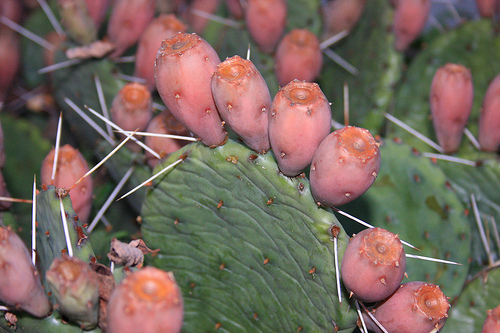
Edible fruit of the Kentucky native cactus Opuntia humifusa.
(*photo credit)
November 4, 2018 Two Great Commandments: Love God and Neighbor
The second is this: You must love your neighbor as yourself.
(Mark 12:21)
The Church gives added importance of this gospel passage because a similar one of the same content was in the final weeks of last year's Matthew's readings. Does this subject of love of God and love of neighbor ever get exhausted even when the basic message is so very simple? Is the problem that we do not know how to love God with everything we have when words are not sufficient and deeds directed to the Divine are so imperfect.
If we search deeper we find that Jesus gives us the basic clue as to how to love with all our heart -- and we can have the perfect test as to whether we are doing it. Jesus couples love of God with love of neighbor, for we cannot do one without the other. The test is that we are to love the neighbor as we love ourselves. When we look deeper into our own lives we find just how much that self-love is -- to avoid dangers, overcome hunger, seek rest and comfort, and preserve our own lives. With a constant focus and direction along with an interior test we can grow in love of others -- and of God.
Love is shown in actions more than mere words no matter how well chosen: married partners help each other; parents expend for children, artists favor their own products, caregivers show special attention. Billions of words do not equal devoted deeds. Omission of deeds when overcome by allurements of the world can bring us to the judgment of not feeding Christ in the hungry. Thus the need to overcome allurements that distract us from the major focus of essential needs of our neighbor. This goes beyond the religious activity of pious actions and involves the deeper sacrifice of offering our own energy and resources for the essential needs of our neighbor near and far.
What are some of the deeds that show love of our neighbor?
* Speak kindly to our neighbors and those overcome by the burdens of daily life;
* Pray for those who are ill and shut-ins and especially when they ask for prayers;
* Give special attention to those who are trying to fight addictions and substance abuse;
* Be generous to those who suffer in other lands and focus attention on agencies with good track records for assisting others; * Share with our neighbor in creative ways. One of these is to come to church at regular meeting times to support the longings of other churchgoers who are lifted by the presence of a community of believers; and
* Forgive those who have offended us in any manner and go out of the way to show them extra kindness.
Prayer: Lord, give us the foresight to know when others are in need, along with strength and courage to go out of our way to assist them.

Exploring with multi-sensory tentacles: sight, feeling, and smell..
(*photo credit)
November 5, 2018 Know the Reality of Instant Communications
Recently, a story was told of a teenager who had wrecked two vehicles while texting. In one instance, she ran through a red light; in another, she hit a truck from behind while distracted by her messaging. When confronted, she said she simply had to do what she was doing -- a compulsion for instant communication with others. Her state, Utah, is forbidding such operations while driving and the penalties that await one who imbibes alcohol are being applied to this dangerous practice as well. Many good reasons can be made for having devices that can connect with home, loved ones, and 911 in an instant. Consumers are convinced that "everyone" needs access to instant contact with others for safety and welfare. In reply to someone initially shocked by my personal lack of instant contact, emergencies aside, we can uncover some limitations (and advantages) to instant communications:
Name damage -- An instant is enough time to blacken someone's reputation. An irresponsible person need only post an unfounded rumor on the web, and this becomes a permanent entry and remains for search engines to find. The power of such damage is immense.
Time wasted -- People who are in such instant chatter could be doing other useful things that require silent space and concentration such as language study or book reading. Today being busy means being on a phone with someone else or simply texting.
Health threatened -- Chattering becomes a compulsion that not only consumes quiet time, but also exacerbates stressful conditions. Overuse of electronic devices means less time engaging in physical exercise and being outdoors in fresh air and full spectrum sunlight; also overuse of electronic devices can involve neck and back strain, carpal tunnel syndrome and eye problems.
Frivolous overload -- Instant communications means that time required to think out and study problem areas is neglected. The individual who seeks to be always connected to another (parent to child or inverse) is being retarded socially and intellectually.
Ill-preparation -- We can shoot from the hip in an instant and then regret it for years to come. The time lapse to allow emotions to cool is good for healthy interpersonal relations.
Economic advantages obviously exist or else why the explosion of cell phones and instant communication devices in this first decade of the twenty-first century (from nearly few in 2000 to an estimated six billion in use by 2013). For instance, fishers can find markets up and down the coast of Kerala, and thus not resort to dumping excess catch that is unneeded at a saturated home base market; all parties prosper. This expansion of business activity is being felt throughout the developing world.
Prayer: Lord, our prayer is the best instant contact. More people need to learn to use it frequently and well.

Drying seeds of a summer's tall sunflower.
(*photo credit)
November 6, 2018 Take the 2018 Simple Lifestyle Test
As we start the colder half of autumn it is wise to ask whether we strive to live like responsible global citizens on our planet:
1. Grow some of my (our) food -- If we eat food we grow, we identify with the place, control growing conditions, save transport fees, and experience the joy of gardening.
2. Drive energy efficient vehicles -- If we take only necessary trips and lack easy access to public transportation, an energy efficient vehicle can become a major means of conservation.
3. Install LED's in place of incandescents -- This switch, if performed by all Americans, would reduce the need for new electric power plants to almost nil for a decade.
4. Use appliances sparingly -- Refrain from using unnecessary electric or gas appliances; reduce or stop television use; cut off appliances in standby mode; buy energy-saving appliances; keep cool without air conditioning.
5. Use solar energy -- Where the opportunity allows, dry clothes outdoors; install solar space, hot water and greenhouse applications; consider solar food cookers, food dryers and photovoltaics.
6. Heat and cool consistently -- Often people cool to lower temperatures in summer than they find comfortable in winter, and the inverse with heating. Keep year-round at a medium temperature say 70 degrees F (+8 degrees in summer and -8 degrees in winter).
7. Create green living space -- Design and build or acquire relatively small residences, using local construction materials, insulate well, allow for multiple use of interior space, and keep place airy and free of toxic materials.
8. Recycle and reuse when possible -- Disposable materials made of paper, empty metal containers, cardboard, and plastic waste materials should be recycled. Obtain needed clothing and home furnishings from flea markets and yard sales.
9. Replace lawn with edible landscape/wildscape -- Fuel and other resources are expended in mowing and maintaining lawns; these resources could be redirected to less costly utilitarian or ornamental purposes such as gardening or fruit trees.
10. Conserve water -- Most of us know most of the common ways suggested to conserve water (shorter showers, etc.); some people may find the major one (compost toilets) beyond current means. Water savings equal resource savings; consider potable water purification when needed in your residence.
Prayer: Lord, encourage us to live our lives more simply.

Autumn color at its peak in the southern Appalachian mountains, early November.
(*photo credit)
November 7, 2018 Recall the Catholic Worker Founders
You and I may never have had the privilege of meeting Dorothy Day (1897-1980), except through her writings and through the testimony of Catholic Worker Movement individuals whom we meet over the years. Connie Ridge, one of Dorothy's admirers, ran a house for homeless women in Washington, DC; she invited me to go to New York for Dorothy's funeral, but pressing business prevented me. However, Dorothy's life, first as a radical Communist and then as a convert to Christianity, who never abandoned her basic radicalism throughout a very long life, deeply impressed me. She stayed poor and was with the poor. Her passionate devotion to peace and justice issues was legendary. She was a person of integrity who was willing to go to jail when opposing war and injustice.
Dorothy Day's legacy is the Catholic Worker Movement, which continues to serve the underprivileged and the outcast in its rather informal and decentralized manner. The Catholic Worker Movement is not an organized association, and does not have any general rules or trademarks or business logos. It has no national coordination, salaries, insurance policies, and retirement plans, although they are expected of modern organizations. The movement is somewhat anarchistic to say the least. The monthly periodical, The Catholic Worker, is still listed as one penny (30 cents a year subscription), and has substantive articles on peace and justice issues, along with pertinent book reviews and other topics. The paper is produced by a devoted staff of volunteers who live in the style of Dorothy Day. It is assembled at the St. Joseph House, 36 East First Street, New York, NY 10003, (212) 254-1640, near a homeless shelter called Maryhouse at 55 East Third Street.
A closely associated part of the core movement, with my closer familiarity, is a rural counterpart to New York City’s Maryhouse, namely, the Peter Maurin Farm at 41 Cemetery Road, Marlboro, NY 12542. We were able to perform an environmental resource assessment for this property a few years back. The farm also serves as a homeless shelter/office complex. The farm took many of our assessment suggestions, along with others, very much to heart, and is becoming a greener place as well.
Peter Maurin (1877-1949) was a farmer of French peasant stock who is regarded as co-founder of the Catholic Worker Movement along with Dorothy Day. The two were convinced that having rural and urban components in the Movement was appropriate, and so Peter took his farming skills to the Hudson Valley location. My regret is never having met him either, since we most likely shared much in common socially, religiously, economically and politically. Both Peter and Dorothy remain models for many people who struggle to present alternatives to this disjointed and dysfunctional world culture in which we live. They shine as timeless enlightened guides.
Prayer: Lord, continue to furnish us with great models to follow in a time when such need is so great.

Annual Thanksgiving 2018
It's that time of year to show special gratitude to friends who support our Earthhealing efforts. Many other non-profit groups say thanks through note cards, address labels and calendars; however, our program expresses itself day-by-day with a word of encouragement to readers to fight to save our threatened world. We do this through our Daily Reflections that receive about 16 million recorded hits per year (increasingly conservative because many new electronic devices are not being tabulated). Our new weekly Facebook page has received considerable comments from our growing readership. Furthermore, our monthly videos on YouTube have attracted numbers of viewers (over 50,000 year viewing for the collection of 48 subjects). Additionally, my local parish received a national and another state award for its sustainable efforts.
On a totally different note, the world is witnessing the failure of the U.S. to join the community of 200 nations working to implement the Paris Climate Control Accord. The Administration's refusal to cooperate is truly, as economist Jeffrey Sachs says, "A crime against humanity." Our program is working with groups regionally and beyond to make this dire fact known and to take reasonable steps to get our nation aroused to responsible environmental action. Unless more is done at all levels of governance a catastrophic condition will soon envelop our world with rising global temperatures and undesirable effects. We still believe that the poor can be liberators, and so we need to keep them involved in issues. We resolve to do so on our modest financial basis to prove that progress can be made with little resources -- and thus prove possible beyond the economic inequality sweeping our world. We are still hopeful that our Earth can be saved.
Your donations are tax-exempt when directed either to "Kentucky Jesuit Missions” or this specific project "Earthhealing." Thanks again for your continued support. We hope you see fit to help us keep this unique public interest project flourishing even with increased burdens from natural aging and heavy work commitments. Blessings!
Happy Thanksgiving,
Al Fritsch, SJ

Another look at native Kentucky wild grapes, fruits enjoyed by many species.
(*photo credit)
November 8, 2018 Create Domestic Comfort Zones
Once on a brisk autumn day, when we were performing an environmental resource assessment in the Northeast, we found that some residents in the same institution were using air conditioning and others heaters. That strange anomaly occurred several more times with the expression, "Oh no, that is not unusual; it happens at our place all the time." Heating and cooling the same building simultaneously! Isn't this energy waste? I have entered some overheated rooms in winter and some terribly cooled rooms in summer. At my car maintenance place, my remarks at over cooling in summer found ready agreement by the accounting person, "Yes, and that is why this heater is on near my feet." Comfort zones?
This reflection repeats one of the practices mentioned under "Staying Cool through Summer's Second Half" (July 31, 2018). However, here attention focuses on heating, not cooling -- and the resultant energy bills for the coming winter months. Americans often tolerate (demand) cooler or lower summer indoor temperatures in air conditioned space than they "tolerate" in heated space in winter. A building will be cooled to 62-65 degrees Fahrenheit in summer, and the same space heated to 75 degrees in winter for the very same people showing, if nothing more, their propensity to waste energy. The difference between what is desired in summer (62 degrees), if followed in winter, and the 75 degrees, if followed in summer, could save close to one-third of heating/cooling bills.
For heaven's sake, establish a comfort zone. Say, set the thermostat at 71 degrees. Now advance it 8 degrees as the "summer limit," that is, 79 degrees, and cool to this temperature; now reduce it 8 degrees from the 71 medium for the "winter limit" of 63 degrees. If people find either extreme too much, set their temperature as required -- but adhere to it in both summer and winter. Establish their collective comfort zone and abide by it. Then if they find this intolerable due to being too hot or too cold, move them to cooler or warmer parts of the building, and have them adjust the amount of clothing worn, which common sense really dictates. Honoring one's comfort zone year round could result in major energy savings.
Getting a person familiar with thermometer readings, and his or her own comfortable feelings, is an educational task in a country that says we must be super-cooled in summer and super-heated in winter. Both of these are unhealthy conditions. Should we tolerate complaints of an overly pampered people? As an important side benefit in establishing comforts zones, studies show that residing in higher summer temperatures and lower winter temperatures cuts the instances of flu, common cold, pneumonia and other respiratory problems. Think of human health as part of the total human comfort zone, for who enjoys a nagging cough?
Prayer: Lord, teach us to see the gifts You have given as meant for our benefit, not our extravagance. Help us to take comfort in and delight in sharing resources with others.
Citizen Vigilance and Net Neutrality
We recall that exactly a hundred years ago this weekend a world hoped silenced guns meant the end of all wars -- but that would not be so, for hope springs eternal. Furthermore, citizens spoke through the vote and now new measures and promises are set to be kept or broken in 2019. National legislators have great tasks ahead including the return of America to its rightful place within the community of nations. Global collaboration demands an effective Internet that includes citizen controls.
Consumers versus citizens. Consumerism has evolved from the times of Henry Ford's Model T, a mass-produced product for which all waited patiently in line to buy that essential vehicle to replace horse and buggy. With a saturated Model T-market auto makers conceived a new gimmick of custom-making products for consumers who wanted an auto that fulfilled individual luxury perks (customized fashion and design). Wolfgang Streeck in "How Will Capitalism End?" speaks of citizens as consumers; he points out that institutions (including political parties) are abandoned by those with individualized wants, people unwilling to take the time to discuss and abide by the consensus of a group. Unfortunately, advocates of social media follow habits of "borderless societies of temporary co-consumers" (in Streeck's words on p. 103).
New consumer habits. Social media users choose their own favorite groups on Twitter, Facebook or YouTube by clicking the "like" button. The tech giants love sponsoring this opportunity for selecting, for they receive data for identifying individualized marketing firms, politicians and celebrities of every sort. People tend to affirm the likes of those who agree with them. Rather than accepting differences so that one can be more broadly united, the option is to withdraw to a small grouping of like-minded folks. Social media caters to this and their side-bar advertisements are geared to entice online purchases of peer-approved luxury goods.
Political actions needed. Believers in the future must accept a countercultural stance to lock-step consumerism. We must do more than symbolic gestures in order to affect real control on the Internet. Our environmental action is more than writing a poem or planting a tree; we must work through citizen participation at the political level. Consider this citizen action as on-going: volunteering in campaigns, lobbying, letter-writing or petitioning against the slow rate of legislative action. We must question high-priced campaigning and inordinate influence resulting from the practices associated with the Citizens' United policy. We quiz elected officials as to what they are doing to protect our global environment. Finally, we must remind ourselves that we are all partly to blame for the current situation through our distracting consumer habits and our tolerance of the practices of the super-rich. Change is needed and citizens must act now.
A current battle. Let us go beyond the mentioned tech giants and consider another set of rules that have briefly been initiated and then repealed, a beginning step in controls for openness related to the Internet. In 2015 a "Net Neutrality" set of rules was imposed as sufficient governmental oversight on Internet Service Providers (ISPs) such as AT&T, Comcast, Verizon and other big Telecom firms. However, during the current Administration in December 2017 the Federal Communications Commission (FCC) repealed the "Net Neutrality" rules. These rules restricted the power of ISPs to influence loading speeds for specific websites or apps. This repeal has culminated in an on-going period of protests and controversies. The rules prohibited broadband providers from working with a priority favoritism for specific websites. The issue suddenly became political when the 2017 repeal vote followed strict party lines. While this loosening of controls was to go into effect this June, no policy change has yet been noted.
Giants divide. Advocacy groups are now pressing Congress to stop the FCC decision from ever taking full effect. In mid-August some 22 states and the District of Columbia asked a U.S. appeals court to reinstate the FCC rules. A week later a variety of big firms and trade groups representing Alphabet, Facebook and Amazon urged the same court to reinstate those landmark "Net neutrality" rules; these included the Internet Association, Entertainment Software Association, Computer & Communications Industry Association, and Writers Guild of America West. The argument before the court is that the current FCC position is flawed, unreasoned and unreasonable. Enhanced transparency is meant to allow market forces to ensure consumer access, but that is wishful thinking. Recall that consumers cannot quickly switch providers.
Broad-based opposition. The states also have entered the act; some 22 states have a lawsuit pending to reverse the FCC's effort to restrict openness. California has taken the lead in opposing the move to abandon net neutrality through their own SB 822 and SB 460 that ensures state-wide neutrality. When California becomes a major net neutral state then the entire big telecom program becomes frustrated -- and other states will set up an assortment of rules that make Internet practice all the harder at a national level.
Democracy is at stake. The struggle to keep the Internet open for ordinary citizen use is a struggle running counter to the favoritism and elitism brought by those controlling the Internet at this time. In one way, the democratic process is at stake, for if Internet features are bid to those more willing to pay, the little person is soon left out. What has been considered as Commons is at the mercy of the privileged few. Democracy is to be of, by and for the people. Rules and regulations are necessary as are fair taxes and procedures to tame profiteers; so is openness to be guaranteed. Our citizenry must continue to petition, lobby, march, confront and freely communicate with elected officials on critical issues like campaign finance reform and disclosure as well as curbing climate change. Younger active citizens are rising to the occasion and are needed in 2019 legislation and regulations.

Observing a moment of silence before the many graves as Ft. McPherson National Cemetery.
(*photo credit)
November 9, 2018 Honor War Veterans
Vince was a war veteran who would regale anyone who visited his Frankfort, Kentucky, home with stories about his adventures in Europe during World War Two. More than just talkative, he was enthusiastic in his narration of those stories. And he had a written collection of episodes, which described much about his character and conduct during the liberation of France and Germany in 1944-45. What a veteran! After many fruitful senior years assisting others, especially youth, he passed on to the Lord.
Recall the day after tomorrow what happened at the 11th hour of the 11th day of the 11th month exactly one hundred years ago. The armistice to the "war to end all wars" occurred. But unfortunately we experienced other conflicts since then: World War Two, the Korean War, Vietnam, the first Gulf War, Iraq and Afghanistan (some sixty major conflicts in sixty years).
War veterans deserve remembrance, for they risked their lives for others. A while ago an Iraq war veteran came to my door and asked for food. It struck me that while we make an effort, Americans so often overlook the welfare of their veterans. Lately, the federal government has done a better job with veteran hospitals, educational packages, retirement benefits, burial expenses and cemetery places. For the sake of their mental health, many veterans strive to forget the wartime episodes. Only in recent years has medical attention been directed to assisting those who have been Post-Traumatic Stress Disorder (PTSD).
Now the few remaining World War Two veterans in their 90s pass on each day -- and the services of honor guards are called forth with frequency. The last Civil War veteran died in 1955, and the last of the World War One veterans has been laid to rest. Thus glory passes! In turn, each war's group of veterans gathers for graying and thinning reunions. I recall, when in studies at Fordham University in the 1960s, observing a mustering of a few New York area World War One vets at a campus memorial-- a sad looking group. Unfortunately, total veteran ranks seem to be replenished with each successive war and we have had too many. War veterans express a sense of fidelity and willingness to sacrifice for the common good of our country; they have risked life and limb for others -- and are worthy of our deepest respect. Unfortunately, many affluent Americans are distanced from those who serve in the military and from those dying in the line of duty or becoming new veterans. If we are to heal our Earth, we need people who are willing to sacrifice and devote some of their time for others -- though hopefully not in harm's way.
The struggle to save our wounded Earth is just as important as any of the foreign wars America has fought. We need people willing to become veterans who "wage peace."
Prayer: Lord, teach us to respect the veterans who risked much, for what we so often take for granted.

Mallard duck takes rest on fallen timbers.
(*photo credit)
November 10, 2018 World Science Day for Peace and Development
Once a year we reflect on how science can lead to world peace and development, to beating swords into plowshares, and to divert military expenditures into peacetime ones. Science and technology can be promising in working towards peace in numerous ways:
* Energy research in coatings could facilitate the production of low-priced photovoltaic energy that could compete with electricity generated by coal-fired powerplants. Potentially, the solar coatings on rooftops or other hardened surfaces could generate sufficient electricity to make centralized powerplants obsolete -- as will most likely be the case by 2050. Lower costs for wind-generating equipment and further research in a future hydrogen economy are other fruitful areas of development as well;
* Drug and medical developments could be the cure for a wide variety of unconquered diseases. Malaria and many tropical diseases could be attacked, and the toll of one child dying every six seconds from preventable diseases could be halted, if resources were focused on curing and healing those already affected;
* Security surveillance, through rapid and low-invasive personal identification procedures and monitoring systems, are open to technological breakthroughs and to making the world safer;
* Food safety monitoring, especially with regard to the vast volume of imports from other nations, is a high priority in this country -- and proper screening and decontaminating procedures are to be perfected and installed;
* Disarmament procedures to detoxify and completely destroy chemical and biological weapons and the nuclear stockpiles should be implemented so that terrorists do not have access to them, and the temptation is reduced to use them in times of stress;
* Expand food production in proven ways. Cultivating kelp is a method of using marine expanses to produce vast quantities of wholesome food (China produced 7,000,000 tons in 2015), and reducing ocean acidification simultaneously. Growing perennial grain crops such as kernza is a practice that reduces soil erosion and unnecessary tillage without use of large outlays of pesticide applications;
* Aids for the physically challenged, need a close coordination of science and technology. Some of the improvements such as allowing computer and Internet access to the blind are truly marvelous. One could also add all types of educational improvements for the mentally challenged as well; and
* Low-priced water purification systems are needed as potable water becomes a growing problem in rapidly urbanizing areas. Systems must extend beyond small scale purification of drinking water at residential levels to include desalination of vast quantities of water, for irrigating dry areas needed for expanded food production.
Prayer: Lord, inspire us to turn our collective attention away from weapons of war to bringing peace, a noble undertaking far less costly than a trillion dollar world annual military weapons program.

Turning leaf of American sycamore, Platanus occidentalis.
(*photo credit)
November 11, 2018 Acknowledge the Power of the Widow's Mite
This poor widow put in more than all the other contributors to the treasury. For they have all contributed from their surplus wealth, but she from her poverty, has contributed all she had, her whole livelihood. (Mark 12: 41-44)
In a small village among the one million such communities in the vast country of India, some people are turning to bike pumping and small-scale wind power to meet their emerging electricity needs. They are not waiting until the umbilical cord of a transmission system reaches them; they are becoming self-sufficient through their own efforts. Through their own skill as poor folks they are contributing to the saving of our wounded Earth. How different from a fossil fuel advocate who wants electricity from a coal-fired plant emitting toxic pollutants. Many contribute to Earth's ecological treasury with all they have, their livelihood.
Every time we read the story of the little widow placing the few coins that she needed into the treasury box and hear the clinking, we are touched. What else could we do? Her story is repeated many times over in many different ways: those who give themselves as caregivers for a loved one, or donate to the Christmas kettle, or share the meager produce of a small garden. Each contributes in a small way, but all who whole-heartedly give have their own power. First, small gifts give hope to the recipient; then they also empower the giver in a special way; third they become an example for others who realize that they must do the same from an inner voice calling to share; and last but not least, they contribute to the power that the lowly have through the spiritually dynamic act of Resurrection to new life.
Large contributions receive publicity, adulation, and are a subtle exertion of power, for the wealthy say that what is given is theirs to give, and that they have the right to dictate how it is spent. Is a billionaire really giving, or simply seeking support so that he or she can continue to hold on to billions of ill-gotten goods that belong to all the people in the commons? Large contributions have pernicious ways of making recipients the supporters of givers, and thus ensure the capitalistic system.
The very "small" contributions from one's want or need are extremely powerful. A freedom is exercised by the giver; a trust in the power of God, satisfying needs and working in the world, is expressed; a dynamic of giving totally and thus receiving totally is at work, for from death to self comes all new life in sacrifice.
As observers of the scene of giving, where do we stand between excessive adulation of the wealthy and overlooking the small fry? It's far better to work with the small contributors and help restrict holdings of those who can dictate where their excessive wealth is to go -- and do this through truly fair taxation.
Prayer: Lord, teach us to see small gifts of generous people, as examples of what is hoped for in an emerging better world.

Monarch butterfly, Danaus plexippus, along autumn's migratory route.
(*photo credit)
November 12, 2018 Take Seriously Geography Awareness Week
Geographic illiteracy is rampant in America -- and perhaps elsewhere in this world. As many as half of Americans could not name the various states on a national map. Can you name all the state capitals? The major river systems? The major Interstate routes and their origins and destinations? Can you identify the G-20 nations and their capitals? The major sports teams and their host cities? Just how good are you at common geography? What about Jim, the New Englander, who told me he thought Buffalo was where bison roam; he boasted of having never crossed the Hudson -- after being three years in his New York City's Bronx residence. He did not desire to be a foreign traveler.
On major travels we no longer need to use maps and rely completely on the auto GPS system -- not knowing which direction is north or south. If it is not the automatic tour finder one has come to follow exact directions spelled out on the Internet with verbal directions on exact points in mileage for changing to a new road; the trip map can be printed out for us. The good part is geography made too easy, and delivers the best current route. It has the bad effect of a "Spell Checker" for a lazy word smith, and tends to make us overlook the places we pass.
The waning ability at using maps makes travel a basic way to improve our local, regional, national and even global geographic skills. Map reading can become an entertainment or learning experience that gives us a sense of place, which may remain in our minds long after the trip. To a lesser extent so do travel books and stories, video and audio tapes, educational TV shows, and movies. Some people do enjoy maps. Inspect our Ethnic Atlas of the United States on this website.
My boast to others is to be able to travel to within ten miles of where 90% of Americans live without using a map. That involves using the U.S. Interstate system to reach distant populated areas. The catch of course is the other 10% composed of scattered rural areas, and the difficulty involved in the last 10 miles, especially in major metropolitan areas. While the boast is nice, it can also mean taking some traditional routes, some temporarily hindered due to construction. We may tend to neglect to consult roadwork and detour advisories found readily on the Internet.
Geographic awareness gives us all a sense of where we are, the great expanse of America, the diversity of places and cultures, proportional state and regional distances, scenic beauty, local history, and interconnectedness of populations. What we hear in the news makes more sense, if we know where the places named are located relative to others. From an ecological standpoint we learn mountain barriers, river watersheds and climatic conditions. Our national consciousness is related to the geography of place.
Prayer: Lord, help us to want to know where we are, who is our neighbor, and how they are related to us in many ways.

Fall-blooming crocus, a surprise for the autumn garden.
(*photo credit)
November 13, 2018 Set a Swords-into-Plowshares Course
We Americans have inherited from previous mind sets and circumstances, not the splendid isolationism of earlier America, but the onus or responsibility of being the "police force of the planet." However, this more recent policy (since World War Two) has come under scrutiny by the current Administration. We recall that a principle of subsidiarity is that each community at whatever level should be in charge of its own welfare to the highest degree possible. Nevertheless, some issues transcend the ability of a local community, e.g., pandemics, natural or human-made disasters of various sorts, climate change, globalization issues, etc. As a nation we must be involved -- but we do not have to act alone.
Isolation can lead to a buildup of nuclear weaponry that is really not national security but a danger to the entire peace of the world. Every effort has to be made to reach a popular ultimate goal of eliminating the world's stockpile of nuclear weapons on an enhanced timetable. A number of nations have been invited by the 2017 Nobel Prize-winning International Campaign to Abolish Nuclear Weapons to sign a global treaty to remove such weapons from their countries. This is similar to the existing agreements to eliminate chemical weapons, land mines, and cluster bombs. However those, such as our country with nuclear weapons, do not want to even consider this radical global treaty.
Another difficult economic issue emerges: why shouldn't outmoded and unnecessary military industries or bases be closed for the common good and the need to turn swords into plowshares? The determinations are made by impartial observers, and the decisions have been accompanied by recommendations to members of Congress, some of whom wallow in the economic pork barrel. The local political clout of members of Senate and House of Representatives seems to be at odds with the national and global good of closing unneeded military establishments. Voters must move past special interests and encourage their elected representatives to vote for what's best for the country and world.
As a nation, we have become far too dependent on the military -- somewhat like a chemical or drug dependence. Interest groups are good at lobbying for pet projects. Closures need not be bad news, especially when land, materials and financial resources are now freed up for peacetime uses. However, peace-making opens a host of job positions that may not be as lucrative as military enterprises, but can be quite fulfilling. Few resources are given to opening lands for training peacemakers in a variety of capacities, for training overseas specialists, for basing and locating disaster relief workers, and for researching and testing materials to be used for appropriate technology both at home and abroad. Preparing for worker retooling and conversion is just as important as shutting down military facilities.
Prayer: Lord, teach us to be peacemakers and to see the benefits in reducing military base and weaponry expenditures.

Natures's "recycling" as debris buries discarded mussle shells.
(*photo credit)
November 14, 2018 Make America Recycles Day Meaningful
Tomorrow is America Recycles Day. Has the term "recycling" gone out of style even before it has acquired its full effectiveness? Let's consider not just what we are doing individually, but what our community, state and nation are doing to reuse materials. Most of us recycle a few things, if nothing more than donating clothes to be reused by another. Some are in communities that support recycling centers for metals, newspaper, cardboard, and many plastics. Much depends on regulations, convenience of pick-up services, accessibility of drop-off points, and even the incentive of money for such conservation measures. Unfortunately, "recycling" is a chore, and inconvenience simply does not really grab our imaginations.
I grew up before the advent of consumer plastics, and before the word "recycling" was a common term. Yet on our farm we were strong recyclers. Wood wastes and paper tinder were burnt in fireplaces and used for plantbeds, glass jars reused for canning or crushed and mixed in some concrete, ashes scattered on garden areas, clothes passed on to more needy families, food wastes fed to dogs, hogs and chickens, manure and agricultural wastes spread on the fields, rocks (limestone) crushed for pasture land, and wire and other metals reused to reinforce concrete or to be refashioned in the blacksmith shop into metal items. Virtually nothing went without being recycled, because it never left the farm, where neatness was a virtue demanded constant attention. We were not perfect, for we filled our sinkholes (in a limestone and karst region) with some unusable glass products and building materials.
The need today is for each citizen to regard it as his or her duty not to allow things to leave the premises without their reuse or disposal being responsibly designated. If this were the case, we would reduce the waste materials considerably. We would sort our waste materials and take them or ensure that they get to recycling centers. Currently, our local recycling center is a half mile away and this center takes clear and colored plastics, metals, newspaper, and cardboard. Our church takes unused clothing and other household materials, and these sell well at very low prices to those in need. All my food scraps and other organic wastes are composted in the garden area bin for fertilizing soil. We strive to make a conscientious effort to reduce landfill-bound materials.
A national recycling policy could reduce wastes and the energy needed to process virgin materials. Actual subsidies or tax relief ought to go to recycling centers, since profitability is marginal except on a high volume. Methane generated at landfills could be utilized as fuel. The return of the deposit on beverage containers would go a long way in cleaning up the countryside and reducing the waste volume. Municipal garbage could be composted and used as soil supplement in specific locations.
Prayer: Lord, teach us to use all things wisely and to see that nature has no wastes; nor ought we.

A busy colony of ants, living in complex "simplicity."
(*photo credit)
November 15, 2018 Observe Use Less Stuff Day
Why constantly bring up the need to halt acquiring and storage of unnecessary stuff? The reason is that "stuff" has a way of retarding our growth in environmental consciousness in very subtle ways. Stuff costs money and effort to acquire and maintain. We seldom think of just how much of what we buy in order to have enough to meet essential needs is junk. To earn the funds to make such purchases consumes more and more of our lives. Boaters and camper owners spend much time paying off the bills for big ticket items. These including folks with credit card debt must ask some basic questions about our frequently overstuffed residences:
Foods: Do we need so many items in the pantry? On the dinner table? In the refrigerator? Do we tend to consume less by buying a more limited number of items from lower-priced stores (example the Save-A-Lot chain) handling a smaller variety and fewer brands?
Household cleaners: Do we need all the various brands and varieties or can vinegar, ammonia, a box of soda and a basic cleanser be sufficient for most jobs?
Paper materials: Do we share books, periodicals, and other printed materials with like-minded people? Do we reuse the blank backs of paper sheet as scrap paper?
Containers: Do we reuse containers when storing or purchasing items? Do we buy bulk products so as to reduce container use (bulk beans requires no metal or glass containers)?
Energy conservation: Do we curb use of lighting, cook in larger batches, heat and cool within established comfort zones, and do we turn off unused electronics? Do we use renewable energy? Do we dispose of unused electronic devices cluttering the place?
Water conservation: Volume wise, water is the stuff we use most of -- and that can certainly be essential use. Do we use only the water required for brushing teeth and washing larger and less frequent loads of clothes or dishes?
Gardening: Do we practice organic gardening that uses no commercial (non-natural) chemical pesticides and similar plant-growth-related materials? Do we grow more of our own food?
Cosmetics: Are we willing to omit unneeded beauty products and perfumes? Do we see that stuff makes us unpresentable?
Transportation and Rest: Do we refrain from travel so as to rest? Do we see that much can be done in the free time that less travel entails? Isn't it tempting to escape a stuffed up place?
Prayer: Lord, give us the insight to see the disadvantages of a materialistic culture, the way that things direct our lifestyle choices, and distort our aspirations for a better quality of life.
Internet Controls at Home and Globally
Throughout this autumn we have been reflecting on control of the Internet, an instrument necessary for global collaboration, especially when addressing the need to curb climate change. Those who focus on local or regional regulations can easily overlook the global collaborative challenges before us. Furthermore, successful global ventures are daunting, and some think they are virtually impossible with a contingent of ISIS terrorists creating disorder. However, here the call is for those with faith in the future to profess what they believe. For the sake of Earth herself we must join together with believers to curb carbon dioxide and methane that produces greenhouse effects, which melt ice sheets and raise ocean levels to flood large portions of populated coastlines.
Collaboration needed now. In order to communicate globally we need an Internet that is open, free and embracing citizen control. We realize that collaboration is more easily done in nations with broad Internet accessibility and free of interference from repressive governments. Simultaneously, we must be free of repressive tech giants bent on profiteering through advertizing and commerce in personal information. It will take maximum cooperative endeavors to expose the dangers of human-caused climate change, and special efforts at restraint by traditional polluting sources. We all bear responsibility to help find solutions to making a new economy built on trust and equality, and Americans who are removed from international cooperation must change the national policy.
Communicating encouragement. An election has just occurred and new faces will be sworn into public office in January. Citizens take it upon themselves to show that the civic duty to vote doesn't stop at the ballot box; encourage all to take part in civic monitoring of legislators. All must work together to reach some sort of workable consensus that is bipartisan in nature and global in outlook. This involves an openness that stretches beyond the voices of well-subsidized lobbyists and experts. Here the Internet plays a vital role for our openness through social discourse that means we must follow the issues and converse and petition where necessary; our social networking must involve a political element that reaches beyond local and regional boundaries to our world.
Promoting renewable energy. The global community is moving away from fossil fuels; this is not fast enough, especially since fracking of natural gas has made this fossil fuel a substitute to replace dirty coal. It takes resources to bring about the transformation, and certainly the heavy subsidies currently given to fossil fuels and nuclear energy could be redirected to energy efficiency and renewable wind, solar, geothermal, hydro and tidal sources. These need to be promoted fully through a free and open communications where options for debating the energy economy is a ploy by Big Energy for extending fossil fuel profit-taking by the merchants of doubt.
Affirming the Commons. In the tradition of Ben Franklin, who sought controls on individual wealth two centuries before the current time, we ought to be faithful to that founding father; it is time to insert these controls today as a background of building trust in democratic procedures needed for the immense challenges before us. In order to be partners within the Commons we must refrain from wasteful practices that exacerbate climate change and join the world community in conservation and a simpler lifestyle. This takes active promotion in the social media.
Simplifying lifestyles. It is hypocritical to expect that our consumption patterns will continue while we expect those in developing countries to do without air conditioning or private autos. Our individual choices can be modified by regulations against waste and in favor of conservation: improve and require energy efficient autos, electronic devices and home appliances; removal of plastic from packaging; reduce consumption of meat from animals with low-priced nutritious substitutes; promote public transportation in place of private autos; reuse landfill generated methane for fuel; encourage reduction of lawn size; grow local and household gardens; and install solar energy devices on homes.
Confronting national differences. We can talk about placing controls on American Internet ownership and influence, but doesn’t such procedure only apply to nations with democratic practices? What about other countries that have tighter controls on Internet service or use? Note that the United Nations includes a variety of governance designs and yet benefits can result in mutual working on common environmental goals. Furthermore, a collaborative world community can apply subtle pressure on ruling dictators and autocrats to change their ways in the direction of democratic practice. A more civic participation for common goals can be seen as good economic and social policy for all those of good will.
Facing global crisis. Many of the environmentally concerned work towards a renewable economy at the local level. Our social media is a major asset for this needed transformation. But we are also painfully aware for the time being that the U.S. is the only nation not involved in the Paris Climate Change Accord. Following this recent election, hopefully an awareness of civic pressure to change our administrative policy is necessary for the sake of the world. We believers in the future can do our part and pressure those who influence the president to make some necessary changes.
Acting as planetary citizens. Let's make changing our national policy a citizens' imperative. The United States must rejoin the world community; we citizens must lobby legislators, petition our congress, badger policy makers with political parties, and confront the tech giants that can easily hold us back. We must look beyond the "sacred profit-making practices" and find far deeper motivation in saving our threatened world. We must continue to act in good faith, for if we pray and work together the world will advance in harmony. Let's continue to use the Internet as this instrument of planetary change.

November frost on tender green foliage.
(*photo credit)
November 16, 2018 Drive Smart This Holiday Season
Thanksgiving holidays are America's finest way to celebrate. Nothing can dampen that celebration faster than a "crash" of some sort whether a collision, with fatalities and hospitalization, or a fender bender. The following suggestions are meant for all who travel by means of private auto -- including me:
* Never use a cell phone or text when driving. Keep that as an absolute personal axiom. Tell loved ones you will call them from the next rest stop. Sometimes it is not we, but the other fellow who is driving erratically because he or she is on the phone and not concentrating on the road. More and more states are addressing this growing problem through outright banning of cell phone use and texting by auto and truck drivers. When people call you and you know they are driving, make it curt and tell them that you do not converse with drivers while they are driving.
* Drive defensively. There is an absent-minded driver out there trying to remember everything that needs to be done before taking the Thanksgiving trek. This person could do something unexpected and so be on the lookout. It has happened to me on several scary occasions, especially when someone fails to give a signal. Remember that some people are doing unaccustomed long-distance driving this week.
* Pull off the road when tired. All of us know that it is too difficult -- and dangerous -- to drive when sleepy. Don't fool yourself. The world will remain a better place if you take that quick nap that is the true pause that refreshes. With experience we drivers find that there are ways to stay more alert if we just take the time to do so: a dose of caffeinated beverage, popcorn, an open window for a few moments in brisk weather, loud music to which you are unaccustomed, and another driver to change places with you.
* Know your trip directions. Nothing is worse than not being certain where one is driving. Study the directions ahead of time, look up the exit outlet prior to the one needed, and place the listing on the dash for use when traveling in unfamiliar territory.
You may have your own tracking device and that can help, but learn directions (north, south, east and west) anyway before you start.
* Give some time to prayer. Asking for guidance and strength when the trip begins is a good practice. Some like to say vocal prayers on the trip. Thank God after a successful trip as well.
* Let others drive difficult portions. Some 80% of drivers think they are above average. Impossible! Our skills erode with time, and so we may reduce night or long-distance driving. With age admit skill level and avoid heavily congested areas if possible.
* Drive within the speed limits.
Prayer: Lord, may the protecting angels guide us on our trip.
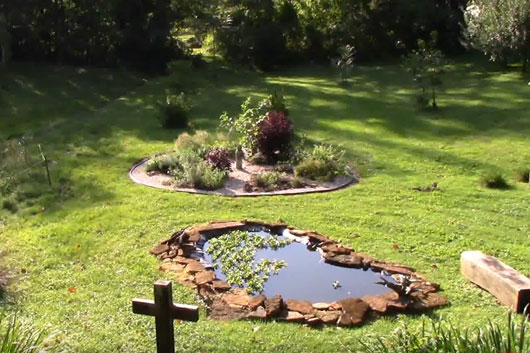
Reflections on the peak of summer's beauty, St. Elizabeth of Hungary Catholic Church, Ravenna, KY.
(*photo by Mark Spencer)
November 17, 2018 St.Elizabeth of Hungary
Today is the feast of a very remarkable person, Elizabeth of Hungary (1207-31), who was Hungarian royalty and the patroness of Catholic Charities and Franciscan tertiaries. Her name is attached to this parish in which I reside. A parishioner in another church of the same name wrote and asked what we do to celebrate the Saint and I promised this reflection; I feel remiss that she has been so neglected after over three thousand daily reflections. Occasionally, I get phone calls from those who are confused and ask to speak to Saint Elizabeth and I tell them that she has died, and they offer condolences; then I confide that this happened about 800 years ago, and that causes added confusion to the caller.
Yes, we can call Elizabeth remarkable because of all she accomplished in her short 24 years of life. She was daughter of a king, betrothed at the age of four to a son of the duke of Thuringia, married at fourteen, had three children, lived a brief but very happy married life and widowed at age 20 when her husband died of plague on the way to a crusade to the Holy Land. Elizabeth was always known for her almsgiving to the poor who lined at the door for food and money; she built a hospital in the basement of the castle and regularly nursed the patients.
For some unexplained reason she was perhaps forced by a brother-in-law to depart and go to Bamberg where her uncle was Bishop. There she became a Franciscan tertiary at age 21 and settled back near Marburg and built a hospice from her inheritance and was assisted by her severe spiritual director in proper administration of her charitable institution. She was a pioneer woman in caring for the sick (until then a man's job) but her health broke down in two years of work and she died in 1231 after having lived a full but brief life. Furthermore, she was canonized only four years after death; fast moving for the Medieval Ages! Who else has done so much in such a short time?
On top of all these lifetime happenings her place of burial became an instant site of pilgrimage with attested miracles. Some of these unexplained activities also occurred in her lifetime, for her family gave her a hard time for spending funds in charity; she was accused of taking from the treasure for the poor and on one occasion her husband and companions asked her to open her cloak and instead of the bread being carried, there were roses showing the hand of God in her work. Her life lives on in the charity shown by others who follow her example -- and in this part of the country travelers ask where the Catholic Church is, knowing this is a place of last resort when down and out. That is a noble reputation that comes in part from the ongoing spirit of people who are trying to imitate the ever-youthful Elizabeth of Hungary.
Prayer: Lord, give us the spirit to engage our lives in service for those who are in need; may we plead for the intersession of Elizabeth of Hungary to preserve us in that spirit of charity.

A harvested shiitake mushroom from cultivated logs.
(*photo credit)
November 18, 2018 Learn Lessons by Observing
Learn a lesson from the fig tree. When the branch becomes tender, you know that summer is near. (Mark 13: 24-32)
The Lord tells us to be observant, to be open to learning from the things around us, to know what is happening, the seasons and the changes in conditions. Often we overlook Jesus' teaching point, and consider only a few people such as naturalists, investigators or insurance adjustors to be keen observers. Jesus is saying that ALL of us must do the same, and be open to the lessons that the things around us teach us. Today, our fig trees are forests undergoing dramatic defoliation. And what about climate change and its negative effects?
Observation is called for at the personal level so that in the Prophet Daniel's words we can be wise and "shine brightly like the splendor of the firmament." The past was not perfect for us; the future can be better. We each have dissatisfaction with the immediate past, whether within our individual lives or our relations to our family. Improving these relations takes observation, for nothing stays stationary; change is always in the air as people grow, mature, rebel, get sick, age and need help. With the grace of God we can go with the flow, ride with the tide.
Observation comes at the community level where we are uneasy at the way things are going around us. We can close our eyes and deny things are going awry; we can excuse ourselves by saying the neighborhood must be cared for by others; we can escape into our own allurements or be reduced to silence. Or we can observe and then act as good citizens. Observation is only the first step, but spirituality rooted in sacramental life leads to action.
Observation at the national level is more disconcerting, for the more we get away from ourselves in the concentric circles that make up our lives -- personal, family, community, regional, and out to this national level -- the less we seem to have a power to influence events. However, it may be the other way around. If we influence another, then a reaction will occur that will affect far more people. Public witness has an effect, whether it be a bumper sticker or a well phrased question at a public meeting.
Finally, observation is needed at the global level. We know that climatic changes are occurring all around us. Glaciers are melting, oceans are rising, forests disappear. This is the end of the ages, and Christ comes in the final seconds of the Earth's geologically age; his second coming is soon to occur according to such a perspective. There is a sense of expectancy, like that of the family awaiting a soldier's return from war.
Prayer: Lord, we give You thanks for the eyes of faith to see, and power to make the changes that this season entails. We prepare as Thanksgiving Day approaches, to find that all things are gifts from You, even this moment of grace to help serve others.
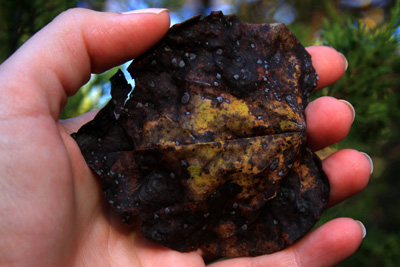
Colors and patterns of weathered redbud leaf, Cercis canadensis.
(*photo credit)
November 19, 2018 Set a Priority to Focus on the World's Poor
On this World Day of the Poor we need to reflect. How many of us could fit into the shoes of an African mother who sees her child dying of a preventable disease? Save the Children estimates that a million children a year throughout the world die from pneumonia. Could all have been saved by a 50 cent dose of medicine or a vaccine that could be mass produced at low costs? As mentioned before, one child dies somewhere in the world of a preventable disease every six seconds. Incredible! That would come to five and a quarter million infants each year, none of whom were able to reach maturity, much less old age.
The cost of saving one quarter of that number of children is estimated at a little over three billion dollars and is being raised by a coalition of groups to buy treated netting to prevent malaria for over one million Africans. Think of that amount; it is the same amount that large banks give as year-end bonuses to their employees. The bonuses of one company alone could have saved the lives of over a million children. Are we able to start showing essential priorities to a wealthy enough nation and world that needs to see essential health and food needs first?
The manner in which this and other rich countries treat the so-called "legal" property holders is an utter scandal. Why? Because the world's wealth belongs to all, and especially to those in basic need. If resources cannot be freed for such essential needs as food and basic medicine, the term “cannot" really means that the laws are fashioned to favor retention of wealth by the affluent. Actually, democracy requires confronting the needs of all people. The most basic want on the part of the billion hungry people of this Earth is for food, and then move a step more and include medicine as well as employment and basic education.
How can we in a democratic society stand by while our poor brothers and sisters suffer? Some people are moved to spend time after retirement or when able to assist in local services for the poor (soup kitchen, homeless shelter, etc,). Others of us can share our food budget with an organization that cares for orphans in a foreign land; my preference is the Catholic Near East Welfare Association (CNEWA). Others are moved to financially support relief organizations providing basic needs to the world's poor.
As concerned citizens we ought to contact legislators by letter, email, phone or personally in order to provide more international relief from wealthy to poorer nations. Maybe a better system of fair taxation is your area of concern, namely a tax on excess wealth so that governmental agencies can have resources to increase help to the needy. Seek congressional legislation to expand programs that support small farmers and health facilities in lower-income lands. We can't remain silent.
Prayer: Lord, inspire us to speak up for the poor and to find the best way to help them according to our own circumstances.

A pair of green frogs, Rana clamitans.
(*photo credit)
November 20, 2018 Celebrate National Family Week
Thanksgiving is a family feast, and so we naturally turn to family support at this time of overly stressed family life. For some of us, the focus will involve entertaining the loved ones returning to celebrate the Thanksgiving meal and gathering; for others who are travelers it is to bring a smile and good wishes to the one who acts as host or hostess. Certainly Thanksgiving is good for families ultimate or extended, who are able to gather and celebrate. But what about the broken families of this world? Can we do something for them?
* Communicate. Greetings to the ones who are stressed the most, or who are isolated may come in the form of letters, phone calls or emails. While most families are able to get together, still others have duties or are hindered from gathering and ought to be remembered. Maybe we can locate and assist them.
* Visit another. Some people are shut-ins and lack the personal visits that mean so much, especially during this week when they will miss the Thanksgiving feast with others.
* Undertake citizen action. Work for a health reform package that includes all Americans. When one in six are not insured, they are outside the "family" of care, and feel the isolation. Our support of total comprehensive health care is the best we can do to make them all part of the family. The same holds for support of affordable housing and equal educational and job opportunities.
* List the anniversaries. Sometime this week recall whether the listing of anniversaries and birthdays is marked on next year's calendar. That ought to be done before it is overlooked.
* Give personal encouragement. Say a good word to those near and dear who struggle with family problems: meeting bills, facing indebtedness, passing exams, dealing with drugs, limiting television and texting time, and many other concerns.
* Serve others. This is one week of the year when volunteer services may be most needed. So often we think of the holidays ahead and where we travel and our upcoming entertainment. However, others hurt in many ways and they need our help. Let's look, see, rise up and do something.
* Pray together. Quite likely this is a practice that is neglected because of busy routines, and yet closeness demands that the Lord be with us in our activities as a family. By praying we discover a great difference in our lives and a spiritual dimension that is so often missing.
Prayer: Lord, help us to expand our view of family and see those who are near and dear, and those far away as part of the entire human family to which we are committed to becoming closer.

Remnants of colorful poison ivy leaves, Toxicodendron radicans.
(*photo credit)
November 21, 2018 Inventory Our Service Potential
God gives us many gifts a number of which have not been actualized. If tomorrow on Thanksgiving Day we list the gifts given, how about considering our "potential" ones that are there to be triggered into action? "What can we do in a better way to change the world?" A thorough personal inventory may be like a resource assessment and require time and possible advice.
A first step is to review the possible areas of service open to you that attract you in some fashion. What type of local service can be easily performed according to where you are at this period and a reasonable amount of time and energy available? Are your interests on a broader level such as state, regional, national or global arenas? If the condition is one of being incapacitated, do your interests lend themselves to communicating with those in need or associated caregivers and telling them you pray for them?
Second, list your personal talents, skills, personal attractions and likes, amount of available time, ability to travel to the site of the activity, and sufficient knowledge about or access to information about the service to be rendered.
Third, list the excuses that could crop up as to why not to involve yourself at this time in this service-- lack of money or time or personal support. Perhaps, a better approach than a full time commitment is starting with a shorter span of time and seeing whether this could be beneficial to all parties before the investment in a long-term commitment.
Fourth, lack of experience or confidence may make you prefer to work in association with others who have established a personal leadership role. Assisting those already giving good service is of immense value that is overlooked by wanting to reinvent the wheel.
Fifth, pray for the grace to have the energy to be of ever greater service, to see that lack of some things should not hold you back from others, that even an acknowledgment in not being fully skilled could be an asset among those with whom you can serve. However, let's not allow the lack of complete skill in an operation stop us from some meaningful effort to help our neighbor.
None of us are perfectly suited for some difficult service decisions. A false humility is a temptation here. A lack of resources may be a resource in itself and allows for an openness and freedom from any preconceived reforming activity that could be secretly put on the agenda for service rendered. We know that "necessity is the mother of invention." Resourcefulness is often quite inviting, and thus a good service tool. Those who come with earnestness can be highly successful.
Prayer: Lord, as we approach Thanksgiving, allow me to see that our giving could even improve, knowing that You have given us many resources that could be shared with others.

Wishful thinking on behalf of family pet at table of vegan pumpkin pies.
(*photo credit)
November 22, 2018 Thank God on Thanksgiving Day
A special reflection is due on our national Thanksgiving Day, the most blessed of our secular holidays. Let us each show our immense gratitude for our many God-given gifts. Even if we were to list as many things as we can think up, there are more in store for giving gratitude well beyond this day:
Thank God for --
* Caregivers and charitable response by so many from different parts of the world for those who are ill, forsaken and the victims of wars or natural disasters;
* People who do the normal services for our community -- the police, fire personnel, first responders, 911 operators, and others who keep us civilized and civil as well as cared for;
* Sufficient energy sources even at higher prices and the added hope that renewable energy sources will be replacing our fossil fuel sources ASAP;
* the people who have touched our lives and have now passed on to their eternal reward;
* New life in all its forms and with all its promises;
* A sparing from a pandemic that could always come at any unexpected time and bring ruin to many communities;
* The United Nations, which is willing to undergo reexamination for the well-being of peoples in every land;
* Relatively good economic health and the protection to save us from the disasters of this past year;
* The use of all forms of rapid communication and the many messages we received and sent to inspire, encourage, and give basic information to others;
* The visits of friends and the hospitality shown us as we travel about;
* The freedoms we continue to enjoy;
* The people who raise and harvest the food that we are eating today, and our ability to obtain sufficient sustenance for life;
* The lives we lived this past year; and
* Our abilities to use the Internet, to read, to reflect, to communicate and interact, and to be able and willing to pray.
Prayer: For all these things -- and more -- we thank You Lord.
Principles of Effective Internet Service
We have raised the possibility that the vast Internet system could be more beneficial if removed from tech giant profit-motivation. When "profits" mean material gain for privileged groups or individuals, the Internet in the public domain is no place for this to occur. Our current lack of controls of this vast system is baffling, and many throw up their hands in despair. However, believers in the future confront these Internet-related Capitalistic endeavors, calling them outmoded and earnestly searching for new solutions involving citizen control of the Internet as part of the total Commons.
Principles. What is needed to make Internet into a citizen’s tool for the benefit of all? A viable solution is the responsibility of everyone who views greater equality in use of resources as being a birthright and not a hopeful dream submerged in an ocean of tolerated greed. Just as our founding fathers enacted a set of amendments to the Constitution called the Bill of Rights, we need a set of basic principles that underlie our communications network so we can more freely and openly collaborate for the common good. These "Principles" that gleam the best from each of the previous seven autumn essays are worth enumerating:
a) The Internet is to benefit all people. As mentioned in the first of this series, the great disappointment of Tim Berners-Lee, a founder of the Internet, was that it did not remain as a people's instrument but was co-opted by tech giants. Opportunists saw an opening for profiteering and carving their own special place and from there made fabulous wealth; all the while a tolerant and confused public accepted capitalistic greed and stood paralyzed. This misuse of the global and easily accessible Internet calls for exposure and control. An aroused citizen must come to a sense of collective ownership and take matters into our hands. However, these controls for the Common Good will take effort and involve general governmental oversight in some way.
b) Internet calls for governmental involvement. The Internet exists in the public domain and needs a transparent policing system that is not a set of private controllers. The hope is that this policing is fair and not oppressive in any fashion. Power corrupts and having Internet "possessions" is a temptation that is best countered by an alert citizenry willing to take the effort to confront policing agencies. Granted, this is not totally possible in some totalitarian regimes, and the call is for a healthy democratic process. It is virtually impossible to expect private ownership and volunteer controls of the public domain. Governments must direct a public ownership of globalization.
c) Collected data must be safeguarded and not commercialized.
The Internet is too important to be privately controlled in any of its service parts. The false concept of gathering personal data from large numbers of users and then selling this data to interested parties who want to commercialize preferences and weaknesses of the users is immoral, and yet has been practiced by tech giants. All such false money-making schemes break down the walls of privacy and ultimately harm all parties. If tech giants object that there is no profit otherwise, the answer is that Internet is not a ground for profiteers but for citizen communication. Personal data is meant to be safeguarded, not sold.
d) Fair taxes and globalizing tech giants are needed. Unfortunately, the Internet has been subject to privatization and profiteering, and these practices are difficult to reverse. One of the most effective and non-violent ways is through a progressive tax that focuses on the super-rich and includes corporations, which control much of the Internet today. A fair tax can furnish funds for infrastructure maintenance, higher education, one step health care for all, as well as proper safety and security of our communications' networks. Coupled with this is globalizing the communications Commons while allowing advertising to continue; all revenues could be directed to Internet safety and expanded accessibility to undeveloped lands. Furthermore, it is desirable that vast commercial enterprises be broken into smaller units.
e) Citizen monitoring is needed. An effort to make governments the principal source of proper Internet functioning, not voluntary contributions from private control groups, demand an administrative transparency as well as an active citizenry who follow operations with a degree of attention. To allow this citizen oversight to lapse would be detrimental to the proper functioning of Internet; it could lead to unfair censorship and favoritism already being voiced as occurring by complaints from certain partisan groups.
f) Internet must always be open through net neutrality. Changing from a general user neutrality to special practices of speed or quality for those who pay for them is totally outside of the concept of the Commons on which a proper Interest as communications rests. The current battle is a start in the struggle to liberate the Internet from private hands and making it a truly open source for all. Openness requires good regulations and controls.
g) The Internet should be global in outreach. Too often we use the Internet frequently to contact local or regional parties. But globalization as enhanced by this medium and through proper oversight is beneficial to all people. The collaboration required to bring about an orderly transition to a renewable energy economy must count on a free and open Internet as an essential tool for a fruitful result. An Internet of profiteering is detrimental to such efforts. Granted, a complete pathway to full collaboration is not clear, but this can hopefully be gained through experience and good leadership. Every effort must be made to ensure that the openness is reciprocal on the part of all citizens. Yes, the task is not easy and the methods deserve further refinement.

Turkeytail fungus, Trametes versicolor, on fallen log.
(*photo credit)
November 23, 2018 Learn to Count Calories
What better day to consider our calorie intake that we have and to be more on the alert about added overweight. What's not listed here can be found on food packages.
Beverages: Soup: per cup
Milk (whole) 8 oz. 160 Creamed soup 135
Prune juice 8 oz. 200 Bean soup 170
Soft drinks 8 oz. 105 Minestrone 105
Coffee (cream & sugar) 95 Chicken noodle 65
Cocoa (all milk) 8 oz. 235 Beef noodle 70
Chocolate malted 8 oz. 450 Beef bouillon 30
Buttermilk skim 90 Snacks:
Tomato juice 8 oz. 45 Fudge 1 oz. 115
Diet soda 8 oz. 1 Peanuts (salt) 1 oz. 190
Coffee black cup 0 Peanut butter sandwich 275
Lemonade sweet 8 oz. 100 Peanuts roasted 1 cup 800
Liquor with soda 8 oz. 150 Apple 70
Breakfast foods: Grapes (1 cup) 65
Rice flakes (1 cup) 105 Pretzels (10 sticks) 35
Puffed rice (1 cup) 55 Potato chips (10) 115
Eggs scrambled (2) 220 Chocolate 1 oz. bar 145
Eggs (boiled/poached) 160 Open egg salad sandwich 165
Buttered toast 170 Vanilla Wafers 3 50
Apple butter on toast 90 Vegetables: 1 cup
Cheese 1 oz. 105 Baked beans 320
Cottage cheese low-fat 1 oz. 25 Lima beans 180
Corn (canned) 170
Fish & Fowl: Peas (canned) 165
Tuna 3 oz. 170 Winter squash 130
Crabmeat 3 oz. 85 Green beans 30
Oysters fried 6 250 Asparagus 35
" on half shell 6 100 Cauliflower 25
Perch fried 4 oz. 260 Peas (fresh) 115
Bass 4 oz. 105 Summer squash 30
Brook trout 4 oz. 130 Spinach 40
Fish sticks 5 200 Potato (fried) 480
Duck roasted 4 oz. 200 " (mashed) 240
Chicken roasted 4 oz. 140 "(baked or boiled) 2.5" diameter 100
Meat: Desserts:
Swiss steak 3.5 oz. 300 Plums 2 50
Porterhouse 3.5 oz. 290 Banana 1 85
Rib roast 3.5 oz. 260 Peach (fresh) 35
Hamburger ave. 3 oz. 245 Grapefruit (1 half) 55
Pork chop 3 oz. 340 Cherries (0.5 cup) 40
Pork roast 3 oz. 310 Blueberries " 45
Pork sausage 3 oz. 405 Yoghurt (4 oz.) 60
Ham (boiled lean) 3 oz.205 Cantaloupe (1 half) 60
Veal chop 3 oz.(medium)185 Pie cherry 355
Turkey/ gravy sandwich 300 " apple 345
Bacon (BLT sandwich) 200 " custard 280
Club sandwich 375 Ice cream 4 oz. 150
Hamburger open sandwich 200 Cookies 3" diameter 120
Liver fried 3 oz. 210

After the harvest. Rustic farm scene, near Broadhead, KY.
(*photo credit)
November 24, 2018 Make Proper Food Choices
America's major day of traditional foods (turkey, pumpkin pie, cranberry sauce, etc.) is Thanksgiving and "leftovers" days. Thus, when these food events are behind us, we look beyond for choices when we eat out again. Since many folks suffer from obesity and other problems, we ought to favor nutritious meals:
Top choice: When food is accompanied by water instead of sugary soft drinks, a meal can have a greatly reduced calorie content (see yesterday's Calorie Counter), even though the fast food places may make water less accessible than profitable sodas. If soft drinks come with the meal, choose a diet drink. Water can replace the desire for an additional double helping.
Item choices: The choices can be quite important, as is shown on the above listing of meats and even soups and vegetables. A serving of baked beans has several times the calorie content of other choices, which may prove just as enjoyable and filling. The same applies to creamed soups in contrast to non-creamed varieties.
Sweet choices: Desserts are usually what do us in. Think about the pie choices at Thanksgivings past! On rare occasions, as on that feast, we may take a calorie-loaded selection, but what really counts are day-by-day choices over time. Fresh fruit is far better than sweet desserts; fruit is filled with nutrition and better types of sugars. Even the selection of the type of pie makes some difference, but that is generally marginal compared to eating fresh fruit. A choice of cheese cake (200 calories for a 2" piece) is better than a piece of chocolate cake with icing (2" piece), which has an astounding 445 calories. Angel food cake of the same size has only 110 calories.
Vegetable choices: Most of us know that vegetables are available much of the year in fresh or at least in frozen and canned form. However, it is fashionable, especially among youth to reject them in whatever fashion. Many cooks regard pasta choices as faster to fix and to fill hungry stomachs. How about more vegetables to replace these standard American menu items? With all our resources, America has rather limited menus, and fast food places know it. Salads and vegetables make good meals, and schools and homes are getting the message -- finally.
Salad Dressing choices: A salad by itself contains very few calories, but many prefer garnishing it with something interesting -- and that is where we find the calories. For instance, a chef salad with regular oil (1 tbl) is 160 calories, whereas with dietetic dressing it is 40 calories. The same salad with an equal amount of mayonnaise is 125 calories; with Roquefort, Russian or French dressing, it is 105 calories.
Prayer: Lord, you endow us with freedom; inspire us to use that freedom wisely in all things, and especially when we choose the foods we eat -- for our own benefit.
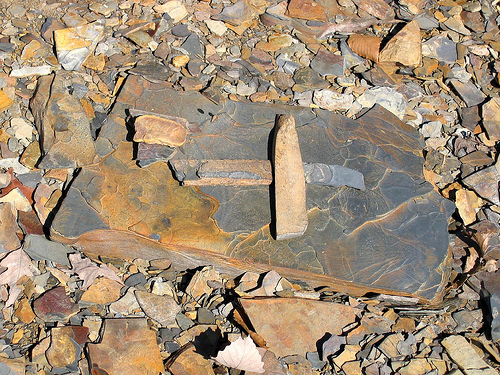
Shale assemblage along Cave Run Lake, KY.
(*photo credit)
November 25, 2018 Act Kingly with Christ the King
Yes, I am a king. I was born for this. I came into the world for this: to bear witness to the truth, and all who are on the side of truth listen to my voice. (John 18:37)
We Americans are steeped in a republican tradition that lacks kings of any sort. Yet today we join the rest of the world in celebrating the feast of Christ the King, as our Church year draws to a close. We can join an alternative crowd from the one that greeted Jesus on Good Friday, for "we have no king but Christ." Being without a national tradition of royalty means we are unfamiliar with nobility and all its trappings, bows, and titles. However, such royal practices are not what Christ means, and so, if we lack these, we may be well along the road of redefining kingship just as Jesus did before Pilate. For Christ, the leader was not someone out and above others, but one who is of service and is up in front of them, an integral part of a body working for the good of all. The emerging divine meaning of kingship does not include privilege or elitism, and we can be radical with Jesus.
People who are more commoner than elite can be of greater service in the manner that Christ encourages us to be. Perhaps the service of citizen militia in the Revolutionary War is closer to what Christ wants than a noble at the service of the king or queen.
This commoner image has a number of advantages: we are willing to take on the humblest role for the good of all; we do not see ourselves as using energy and time engaging in tasks that only set some apart from others; we can stay focused with the work ahead; and we are willing to work closely with others who participate fully in the one Body of Christ.
This more modern and republican concept of kingship allows us the freedom to go beyond finding Jesus answering to Pilate; we, as other christs, must practice a certain independence; we need to define our own roles in the "kingly" work of service, something that comes through our Baptism and the gifts from the Holy Spirit at our Confirmation. Thus we cannot act alone, but we have to make independent decisions while we act. Such freedom includes good and bad qualities, for some would say, "You are acting alone; how dare you not follow the king."
We respond that our king cleaned out the Temple and acted counterculturally. So too as followers of the Lord, we are expected to do what has to be done here and now. We are to be active citizens; we are to take care of each other and our environment; we are to be watchful and on the lookout for those in need; we are to question the privileges of the wealthy, who by their possessiveness seek to control the distribution of what is common to all, and is needed for basic livelihood. Acting in a modern kingly fashion is challenging but also exciting.
Prayer: Lord, teach this unkingly people how to faithfully follow according to the kingly mandates of our baptismal vows.

Solar installation at St. Elizabeth of Hungary Catholic Church, Ravenna, KY.
(*Read more here)
November 26, 2018 Ten Ways to Make Churches Greener
Parishes are called to show the need to members and neighbors that improved environment is a moral issue, a mandate to use God's gifts wisely and well, and to reduce waste and recycle materials where and when possible. However, this is an ongoing process. The following suggestions are not simply theoretical; we have effected them in either or both of my parishes over the last decade or so:
a) Change to energy efficient LEDs bulbs for lighting, especially for most often used lighting;
b) Turn up the cooling temperature in summer and down the heating temperature in winter. Hot water tanks have been replaced by energy-on-demand devices along with clothes washing with cold water -- and the presence and use of clothes lines;
c) Install solar photovoltaics for parish hall and church lighting and general energy use and thus reduce grid-supplied fossil fuel-generated electricity;
d) Change greenspace to "edible landscape" by planting areas in trees (apples, plums, peaches, pears, nectarines, cherries, mulberries, pecans, walnuts and hazelnuts) and 40 varieties of vegetables and herbs in showcase garden area, four permanent patches of mint and interspersed flowers to attract pollinators. The demand for blacktopping for increased car parking was resisted and a wetlands area transformed from lawn into wildscape;
e) Use energy efficient hybrid vehicles getting at least forty miles to the gallon of gasoline. Likewise make an effort to carpool when possible to distant meetings and events;
f) Halt domestic air conditioning and cool out at night;
g) Install and utilize rain catchment systems -- existing cisterns and rain barrels on outbuildings;
h) Add insulation to floors and ceilings along with energy efficient windows;
i) Recycle all paper, cardboard, several types of plastic, and metal containers and compost food scraps and organic materials. Also sponsor monthly sales at low prices of clothing and some household items, which assist the lower-income local community folks; and
j) Distribute food to the needy. Here food handouts are made both through the community cooperative "food pantry" and through individual basic food storerooms. One parish runs a food-purchase and cooking or "Kitchen" school.
Prayer: Lord, give us the courage to do what we preach and show the need to a community that churches must become greener.

Familiar autumn migration of mixed blackbird species.
(*photo credit)
November 27, 2018 Consider An Autumn Verse
An Autumn Message
A change confronts us, a whisper, a hint,
Dawns come later, evenings soon spent,
A profound stirring in nature's fraternity,
Breaking summer's seeming eternity.
Crimson, scarlet, rust and gold are seen,
mixed with verdant pastures and evergreen,
to form a grand finale, a season's clue,
the ebbing of life's cycles which are renewed.
Smells of fall -- dry decaying leaves,
pungent wood smoke hanging at the eaves,
iodine-like black walnuts out to dry,
The scent of mothballs, one can't deny.
Soundscapes tell the time -- the swish of birds
in winter flocks, the cawing of crows --avian words,
the screech of debris that the raker claims,
the yell in unison at the hometown games.
One can taste the change -- picked tomatoes hardly hale,
replaced by endive, turnips, mustard, kale,
and pumpkin pie, squash, pears, mince meats,
and fresh-pressed cider and other apple treats.
Feel the chill, sense the autumn sun at noon,
tempt one's lunacy by the harvest moon,
Goblins, spooks, witches everywhere
foreshadow the coming darkness we fear.
We hastily do the chores of fall -- antifreeze,
chimney‑cleaning, caulking, cut fallen trees,
stacked woodpiles, roof patches, roadway rock.
and that annual turning back the clock.
Our senses tell us something's on the wane,
as nature's cycle cuts into our own fast lane,
that summer's flowers wilt away,
and our bloom of life has had its day.
If fall must come, then let it be,
a time to hear, smell, taste, feel and see,
and give thanks for seasonal friends,
gently announcing our own earthly ends.
AF 2003

Kentucky farm scene, young cow grazes on autumn day.
(*photo credit)
November 28, 2018 Be Prepared with ICE: In Case of Emergency
Since only one-quarter of Americans carry details as to who to call In Case of an Emergency (ICE), it is wise occasionally to think about such matters. No, we do not expect a serious accident will happen to us, but still we just might be wrong. In fact, I recently rechecked my list of phone numbers and found a need for updating. When many of us hike, jog or stroll, we do not carry personal identification -- and we could be hit by a car or have a heart attack. The concept of updating an ICE goes well beyond a standard address book. Who knows when something might occur requiring that our next of kin be notified? And so our attention involves caring for those who are to find out about our mishap and wrap up matters. I strive to carry a "medical guardian" device.
The ICE information should be prominent enough for first responders to have quick access. This idea was promoted after the London bombing disaster in mid-2005, and allows contact of the next of kin to obtain valuable medical information. A British paramedic, Bob Brotchie, encouraged people to enter emergency contacts in their cell phone address book under the name "ICE" along with alternative contacts such as "ICE2" and "ICE3." In an emergency situation, ambulance and hospital staff will then be able to contact these persons. It's so simple that everyone can do it -- at least everyone with cell phones. Other steps could be taken by people who only use stationary phones. Even the posting of passwords to a computer with knowledgeable associates is important, for otherwise such computer records remain inaccessible.
This brings one to another ICE measure, and that is preparing for funeral arrangements long before the hospice worker is called. A notice left somewhere as to particulars would be most helpful for those burdened with preparing one's final arrangements. Our practice within the Society of Jesus is to spell out details (burial instructions, notification lists, liturgical songs, homilist at a funeral, pallbearers, and preferred place of burial, etc.) and to make duplicates and file these with a person who will be responsible for final arrangements. This sheet could be updated since preferences and circumstances change with time.
Living wills are another matter, as well as property wills and other such last testimonies. Even to write about this, makes each person aware that numerous designations have not been completed, even though this is not always a pleasant task. However, once these details are spelled out and delivered to responsible individuals there is a sense of accomplishment in knowing such matters will not burden others upon quick departure. We all have a habit of leaving things to a future date -- and sometimes the postponement goes right up to and includes the ICE event.
Prayer: Lord, help us to take our vulnerability and mortality seriously, at least for the sake of those who will have to be responsible for final preparations. Lord, make us aware of ICE and to show gratitude to future caregivers.
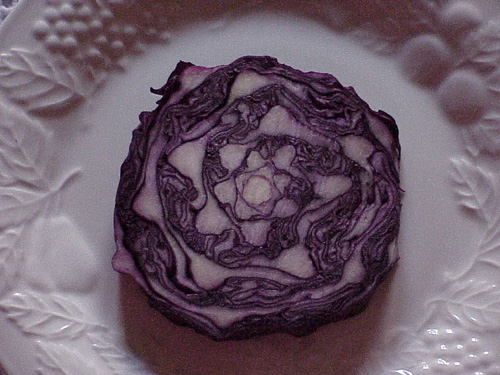
Ornate pattern observed in sliced red cabbage..
(*photo by Sally Ramsdell)
November 29, 2018 Reintroduce Advent Celebrations
Advent and a new Church year will start this weekend. During this holy season we each ought to consider doing something very special to prepare for the holy season beyond creating a Christmas list and arranging tinsel.
Light the Advent Wreath -- This spiritual symbol of Christ's coming originated in the Middle Ages through hanging wooden ox cart wheels in a rather dry location near the home fireplace, so they wouldn't warp in the wet winter weather. These were decorated with Christmas foliage and candles as the season progressed, adding candles as the days got shorter and the nights longer. Today, we make wreaths from evergreen boughs and among them place four candles, three purple, the major Advent color, and the fourth rose for the joy of the third Sunday of Advent. One additional candle is lit with each successive week during the season.
Link Christmas decorations with Advent -- Ask the question amid the decorations, "Who is coming at Christmas?" Advent prepares us to experience a more spiritual Christmas expectancy through the readings of the Old Testament. Consider installing a crib instead of reindeer and Santas. Let festive lights focus in on the importance of that crib scene. When commercial decorations appear earlier, so ought spiritual themes.
Integrate caroling with Advent songs -- Include Advent hymns in the choral singing and caroling. Why should some beautiful Advent songs be reserved for the Church or liturgical settings alone? They may be sung as well with traditional Christmas ones.
Provide for children's celebrations -- Bring in the concept of Mary and Joseph looking for a place to stay, as Spanish families do in their Posadas. This may be a perfect time to intermingle Hispanic and Anglo culture in an integrated gathering and take time to explain the origins of the celebration.
Prepare a special Advent dish -- Several nationalities have their own special foods, especially in relation to fasting from meat during Advent. At home, my mother would make homemade noodles (from flour and eggs) or Alsatian Spaezel in the handed-down recipes that were served with tomato sauce.
Link Advent to Earth themes -- We all await the healing of our wounded Earth and the coming of a New Heaven and New Earth. That expectancy is really part of the Advent liturgy. We should anticipate a future Earth of justice and peace among all people and all creatures. Can't we dream of an Earth where all have affordable housing, adequate food, potable water, a sound education and basic health needs satisfied? Advent means anticipating peace.
Prayer: Lord, come to us in a special way this Advent to make it a spiritual experience for us all here and now. Help us counter the secular commercial world around us.
EQUALITY: Myth or Reality
We hold these truths to be self-evident, that all men are created equal, that they are endowed by their Creator with certain unalienable Rights, that among these are Life, Liberty and the pursuit of Happiness.
Declaration of Independence
Equality as related to economic issues is the most difficult issue I have ever tried to tackle. I only wish I had started reflecting on this matter earlier in life. The cascading economic inequality in our nation and world with so very few people (less than 0.1%) owning so much wealth confronts us with an urgency, which beckons our moral outrage. Our very democracy is at stake at a time most needed to answer the vexing global problem of curbing climate change. Solving this problem demands total citizen participation; we must confront the mega-rich who say there is no problem with climate -- or if so it isn't of human origin.
Current situation. With such private concentrated wealth comes power, and with power comes influence, and with influence comes corrosion of our democratic process by a privilege few. Autocracy emerges. Unfortunately, this threat to our democracy comes at a time when America should be taking a leadership role in international cooperative efforts triggered by the Paris Climate Change Accord. Instead, the U.S. through its denying president has opted out of negotiations. Disaster!
The historical perspective allows us to recall the rocky road to civil equality from the time of the Declaration of Independence in 1776; this included issues of first white male landholders and over time went from there to white male non-landholders, then male slaves, then women, then Native Americans, then young people -- and still it now is dealing with full recognition to the unborn. When economics is involved with its political ramifications, we doubt a rapid practical application of equality to ALL of us -- and globalized economics involving gross inequality makes this problem doubly difficult to solve right now. Time presses us for immediate solutions.
Some basic facts confront us: growing inequality in our nation and world accompanied by the privileged with their fake argument involving Trickle-Down Economics; acceptance by the media and majority to tolerate a super-rich "noble class" in America lacking responsibilities; blackmailing of moral leaders into silence at the critical moment when change is necessary; a mounting upsurge of the oppressed to return to our true revolutionary spirit and assist each other; and a need for a transformation in global thinking about governance, so that climate change issues can be tackled.
Equality Definition. My struggle to come to a new equality is similar to those of the Founders of our country and the thinkers who have analyzed their writings. Certainly we know that this "equality" is not about talents, intelligence, and athletic agility, which we concede vary in amounts to which we are endowed. Danielle Allen in pages 108-9 of "Our Declaration" states that the Declaration of Independence includes 5 facets of an ideal equality:
1. Neither of two parties can dominate the other;
2. Humankind having equal access to the tool of government (not undue influence by the affluent);
3. Egalitarian approaches to the development of collective intelligence (though working through problems collectively);
4. Egalitarian practices of reciprocity (citizens are aware of receiving benefits from others and owe benefits in return); and
5. Equality entailed in sharing ownership of public life and in co-creating our common world.
Trickle-Down Economics." One theory championed by the rich who seek to enhance or merely tweak the status quo is that lower taxes will inspire investment in new developments. In their view this will lead to economic growth and fuller employment. Is this really so, or an excuse to increase greed by those in power? This "trickle-down theory" has no long-term historic verification and has been debunked by progressive economists for decades. Contrary to this questionable fake economics the so-called growing resource pie is full of caveats (limited access to fruits by the poor and increased pollution due to toxic waste emissions from unregulated resource exploitation).
Limits to growth hits us squarely in the face, for it is a solid scientific fact that inevitable material growth is impossible in a world of limited available resources. Note, the unwillingness to counter the drive for profiteering conflicts with fair redistribution of resources. Sadly, those in power have a final word on infrastructure maintenance and improvement, all needed for the Common Good. Adding to this are acknowledged materialistic dreams by many ordinary people accompanied by the blame of envy by those with the good fortune of the "fortunate." A cynic's remark is "sorry there are only a few lottery winners." However, in reality many of the needy are not envious; rather they are desirous of essentials of life for themselves and their loved ones. Today rising health and education costs hit lower income folks hard.
Are there not "Rags to Riches?" For a world of small tradespeople and farmers who strive to get ahead, having enough for a comfortable and secure living has been a lofty goal. A few go beyond those lifetime ambitions and move to higher income brackets; still fewer have made it into the rich upper class. When the nation was young and expanding many immigrants came penniless and entered a growing middle economic class through hard work and proper use of resources. However, current times and higher costs of health and educational benefits make the simpler goals of the past harder to attain. Chances of being struck by lightning are about equal to going from rags to riches. Why are there a billion destitute people with less than a $1,000 and 1,000+ billionaires holding over half the world's resources? By 2010, 388 billionaires owned over half the world's wealth.
Unite with believers in the future. Growing inequality must be addressed. Those who affirm the need for expanding equality as a foundation for democracy believe in a future. Achieving this will take effort that involves harmonizing through global collaborative means. Creating a nuclear core spiritual harmony is discussed in our book "Resonance." Extending this harmonizing to those suffering from inequality is challenging and is the subject of essays for the remainder of the year.
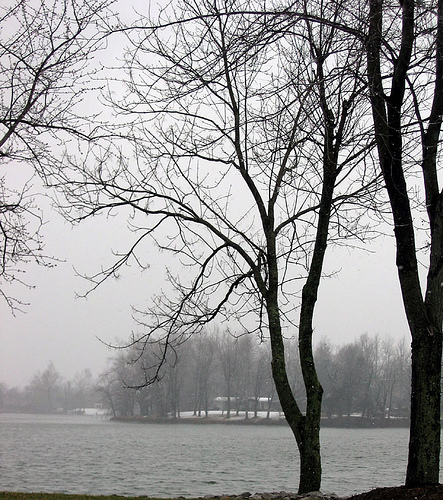
Snow squalls in late November. Lexington, KY.
(*photo credit)
November 30, 2018 Accept the Coming of Winter
For many children and a sprinkling of adults, the approaching December brings thoughts of snow, ice skating, Christmas gifts, jingle bells, green and red decorations, and all the good things of the season. For others, but not all of us, the days of dreary November are now past and we look forward with less enthusiasm but some hope to "the winter months." As we grow older, we find winter weather harder to endure than even the "global warming" summers. Perhaps there are things to break the spell of hardship ahead and we should look for them hopefully.
Freedom: With the heavier layers of winter clothing, we think of ourselves as not being free. Not so. We are free of mosquitoes for another few months, hornets, wasps, snakes, and other creeping and crawling varmints. We are free of sunscreen and sunburns,
air conditioners and their accompanying respiratory difficulties, overly hot porches and bedrooms, stagnant ponds with green algae, dried out or overgrown lawns, leaves in the gutters, and vehicle noises at all hours of the night. Summer is gone for awhile.
Coziness: In what other season can one become so contented? The snow is falling and we can go nowhere for a short while. A cloak of fuel-saving snow blankets the house and allows us to concentrate on a good book or movie. Just stay put and satisfied.
Friendliness: Summer has its parties, but there's something nice about the Salvation Army kettle, caroling among the elders, and tinsel and string of lights on homes we totally overlook at other times of the year. There's a demand that we say "hello," when we would have passed people by at other times. Winter affords communication in ways that other seasons can omit.
Variety: Cooking can be a fine art especially in winter. That's when variety is fine-tuned for people who lack summer's fresh produce. This is the time to bake cakes and prepare candy, try new soups and salads, open up the root cellar and canned goods, get out the nut cracker, make popcorn and, more rarely, kill hogs, resulting in sausage and other pork dishes.
Slower pace: Winter is supposed to be a slower time and not to involve much travel. When we decide to avoid a distant event, we make room to stay home. Winter is when we can think about things needing added concentration; it is prime time for reflection.
Anticipation: Winter is the beginning of a new growing season, and so our thoughts turn to the increase in light in late December, and the stirring of Earth herself. We will soon be beginning a new year, and the old will be behind us. This is the time of hope starting with Advent. We are preparing for new life, and that is something to truly look forward to. Bring on December!
Prayer: Lord, allow us to take on each season as it comes, knowing full well that each has a goodness worth appreciating.
|